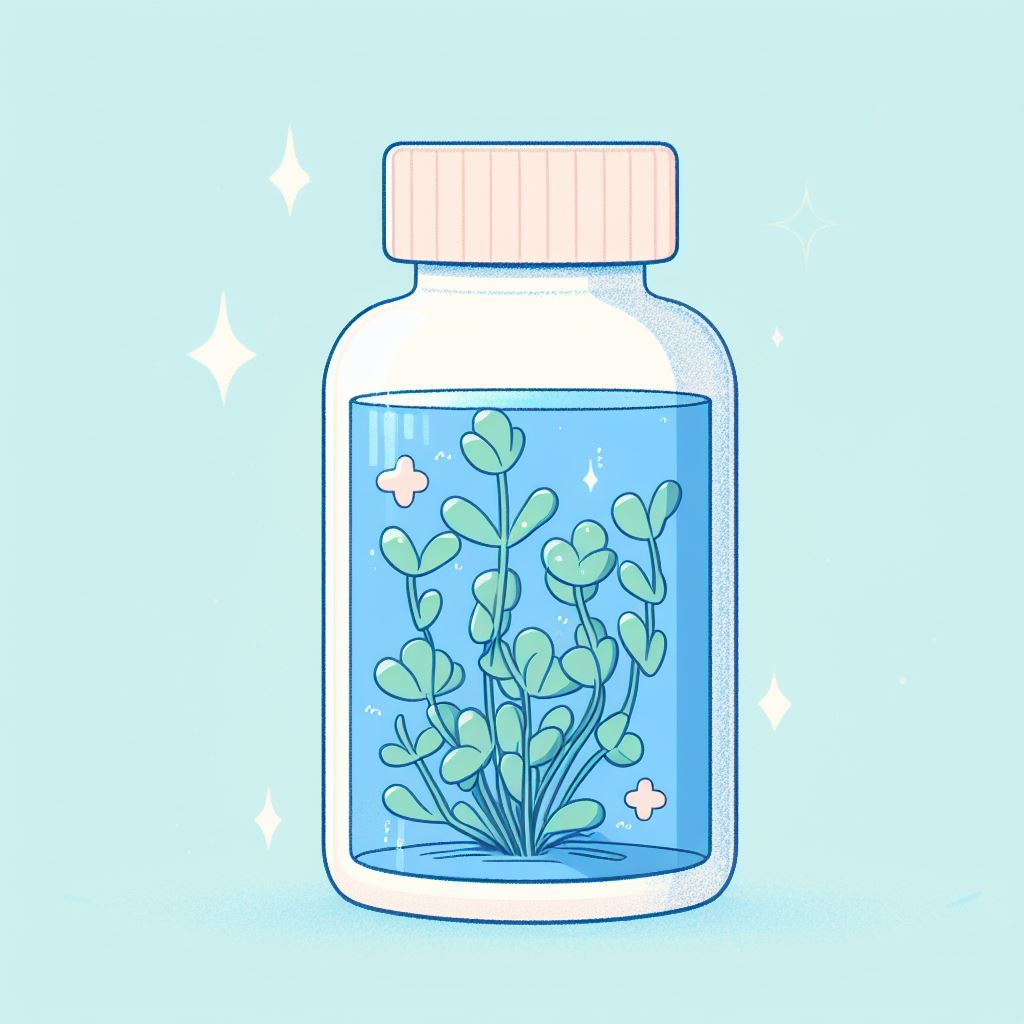
While cod liver oil has been prized for centuries for its health giving properties, it's popularity is on the wane.
Concerns with overfishing and marine pollution, plus a growing population choosing plant-based diets mean vegan omega supplements are one of the fastest growing sectors in health.
There are several options for vegans looking for a suitable alternative to cod liver oil, but which still provide the same fantastic health benefits.
Most nutritionists would agree that the best option is an algae-based omega-3 supplement derived from microalgae, which are the primary source of omega-3s for fish.
Algae-based omega-3 supplements are suitable for vegans and provide a good source of EPA and DHA, the two main omega-3s found in cod liver oil.
Some examples of algae-based omega-3 supplements include Neuromins, AlgaeCal, Ovega-3 and Phytality's Clean Omega.
What is the Best Vegan Cod Liver Oil alternative?
When seeking a vegan replacement for the potent omega-3 fatty acids in cod liver oil, there is only one viable solution: algae.
Numerous studies now confirm that, of the omega-3's, it is EPA and DHA which are the most beneficial for human health. Ala simply does not provide the same benefits.
And in the plant kingdom, only algae offers a viable solution for getting EPA and DHA.
Elsewhere, in healthy foods like flaxseed or chia, you can find alpha-linolenic acid (ALA) but this must be converted by the body into EPA and DHA in order to be used effectively. And the body does this very poorly.
One of the main reasons EPA is considered healthier than ALA is because it is more readily available for use by the body. Cells can directly use EPA to produce eicosanoids, which are signalling molecules that play a role in a wide range of physiological processes, including inflammation and blood pressure regulation. In contrast, ALA must be converted into EPA and DHA before the body can use it.
Additionally, EPA has been shown to have many specific health benefits. Studies have shown that EPA can help to lower blood pressure, reduce inflammation, and reduce the risk of heart disease. EPA has also been shown to have potential benefits for mental health, including reducing the risk of depression and improving cognitive function.
Overall, while ALA is an essential nutrient and has some health benefits, EPA is the more active and effective form of omega-3s. Until recently, it's been simply unobtainable for vegans.
Now, thanks to the cultivation of microalgae for the supplement market, vegans can find very high quality sources of EPA and DHA from a purely plant source.
The Benefits of Vegan Cod Liver Oil Vs Fish
Algae has No Contaminants - Fish, including the fish used to make fish oil supplements, can accumulate contaminants such as heavy metals, polychlorinated biphenyls (PCBs), and dioxins through their diet and the water in which they live. These contaminants can be harmful to human health and may be present in fish oil supplements. Algae oil, which is produced sustainably in large greenhouses, is - by contrast - a controlled process whose purity can be guaranteed.
Algae is Sustainable - There are some major concerns about the sustainability of cod liver oil and its impact of fishing on cod populations. For example, cod populations in the North Atlantic have declined by more than 90% since the 1970s, according to some estimates.
While some experts recommend choosing cod liver oil supplements that are certified by organizations such as the Marine Stewardship Council, which sets standards for sustainable fishing practices, algae oil goes one step further by leaving the marine environment intact.
No Fish Burps - Cod liver oil has a distinct and strong taste that many people find unpleasant. The taste is extremely "fishy", with a thick, pungent flavor that can be off-putting to some people. Algae oil, on the other hand, can be produced to be almost tasteless, so that you can take as much as you need without worrying about the dreaded fish burps.
Summary: The Best Vegan Alternative for Cod Liver Oil is Algae
Algae oil is the obvious choice to replace cod liver oil as this the actual source of fish's omega content in the first place!
With its unique ability to create biomass from the sun that has a naturally high lipid content, algae represent one of the most exciting possibilities for the future of the human food chain.
Here at Phytality, we've worked hard to create what we believe is the purest algal Omega-3 oil on the market, with a naturally high DHA content. Sustainable, fish-free and completely vegan, it offers everything you might want from a cod liver oil supplement but with an ethical, and ecologically sensitive approach.
Vegan Code Liver Oil FAQs
What is vegan cod liver oil?
Vegan cod liver oil is a type of Omega-3 supplement that is derived from microalgae, instead of the liver of cod fish. The microalgae are grown in controlled conditions and then processed to extract the Omega-3 fatty acids, EPA and DHA. The product is marketed as a sustainable, vegan alternative to traditional cod liver oil. An example of such a product is Phytality's Clean Omega.
What are the benefits of vegan cod liver oil? Vegan cod liver oil provides the same benefits as traditional cod liver oil, including supporting heart health, reducing inflammation, improving brain function, and supporting eye health. In addition, vegan cod liver oil is more sustainable and ethical, as it does not rely on fishing and does not harm marine life.
How does Phytality's Clean Omega compare to other vegan cod liver oil products?
Phytality's Clean Omega is a high-quality, sustainable, and certified vegan Omega-3 supplement. It is made from sustainably grown microalgae and is free from solvents and other harmful chemicals. Phytality Clean Omega is also odourless and tasteless, making it an excellent choice for those who are looking for an easy-to-use and convenient Omega-3 supplement.
Is vegan cod liver oil safe?
Vegan cod liver oil, such as Phytality Clean Omega, is considered safe for most people. It is free from harmful chemicals and is sustainably grown and produced. However, it is always important to consult with a healthcare professional before starting any new supplement regimen.
How should vegan cod liver oil be stored? Vegan cod liver oil, such as Phytality Clean Omega, should be stored in a cool, dry place, away from direct sunlight and heat. It is also important to keep the bottle tightly sealed to maintain the quality and potency of the Omega-3 fatty acids.
References:
-
Simopoulos AP. Omega-3 fatty acids in health and disease and in growth and development. Am J Clin Nutr. 1991;54(3):438-463.
-
Zhang Y, et al. Comparison of fatty acid profiles and antioxidant content of microalgae, spirulina and Chlorella spp. J Sci Food Agric. 2010;90(9):1572-1579.
-
Harel S, et al. Eicosapentaenoic acid-enriched microalgal oil reduces triglycerides and increases the LDL/HDL ratio in hyperlipidemic subjects. Lipids. 2010;45(1):37-46.
-
Kris-Etherton PM, et al. Fish consumption, fish oil, omega-3 fatty acids, and cardiovascular disease. Circulation. 2002;106(21):2747-2757.
-
Kaur G, et al. Nutritional and therapeutic potential of algae. Crit Rev Food Sci Nutr. 2013;53(8):738-758.
-
Suzuki H, et al. Nutritional value of spirulina as a protein source for human consumption. J Sci Food Agric. 1989;47(3):289-297.
-
Kim HS, et al. Nutritional and physiological evaluation of Chlorella vulgaris for use as a human food ingredient. J Sci Food Agric. 2011;91(7):1320-1326.
-
USDA. Mercury levels in commercial fish and shellfish (1990-2012). https://www.fda.gov/food/food-safety-modernization-act-fsma/are-there-any-risks-eating-fish-and-shellfish.
-
Tsuchiya M, et al. Comparison of toxicities of microcystins produced by microalgae and cyanobacteria. Toxicon. 2002;40(7):
